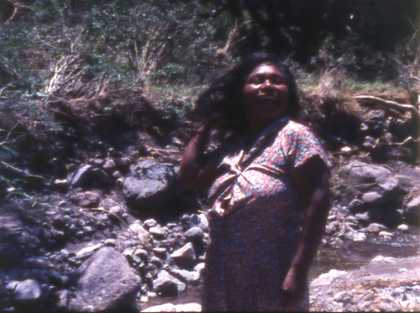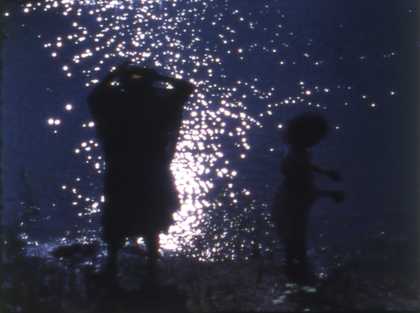Ethnographic films can and should be works of art, symphonies about the fabric of a people, celebrations of the tenacity and uniqueness of the human spirit
Chick Strand, ‘Notes on Ethnographic Film by a Film Artist’ Wide Angle, 1978, p51
Strand's most celebrated body of work are her remarkable films made south of the US border tracing cultural and family histories and reflecting on legacy of colonialism and patriarchal society. Her early film Mosori Monika 1970 made while studying anthropology at UCLA, balances the experiences of missionaries and native Waraos women in the Orinoco Delta region of Venezuela. Strand's last film Señora con Flores / Woman with Flowers 1995/2011 is a portrait of a flower seller in Mexico that although Strand had completed picture and sound editing prior to her death, the final post-production work was only completed posthumously in 2011. Strand has referred to her work as 'ethnographies of women,’ and these films each explore in distinct ways the lives, struggles and desires of women from the feminist parable Mujer de Milfuegos / Woman of a Thousand Fires 1976 that draws on the surrealist routes of ethnography to her compassionate study of neglected wives and lovers of the street musician Anselmo in Anselmo and the Women 1986.
Mosori Monika
Chick Strand, USA 1970, 16mm, colour, sound, 20 min
Preserved by the Academy Film Archive and the Pacific Film Archive
Anselmo and the Women
Chick Strand, USA/Mexico 1986, 16mm, colour, sound, 35 min
Mujer de Milfuegos / Woman of a Thousand Fires
Chick Strand, USA/Mexico 1976, 16mm, colour, sound, 15 min
Señora con Flores / Woman with Flowers
Chick Strand, USA/Mexico 1995/2011, 16mm, colour, sound, 15 min
Programme duration: 85 min
Prints courtesy of the Academy Film Archive



